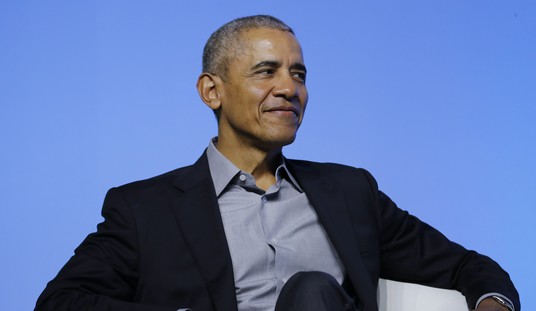President Obama lobbied Gulf representatives at Camp David today on the P5+1 nuclear deal being forged with Iran — and tried to butter up allies by smoothing the way for arms deals that they may, ironically, use to defend themselves against Iran.
Attendees at the meetings included Sheikh Tameem bin Hamad Al Thani of Qatar, Crown Prince Salman bin Hamad Al-Khalifa of Bahrain, Crown Prince of Abu Dhabi Sheikh Mohamed bin Zayed Al Nahyan, Saudi Crown Prince Mohammed bin Nayef bin Abdulaziz Al Saud, Oman Deputy Prime Minister Sayyid Fahad bin Mahmood Al Said, and Kuwaiti Emir Sheikh Sabah Al-Ahmad Al-Sabah.
In a lone press conference after the day’s meetings, Obama said they all agreed “that a comprehensive, verifiable solution that fully addresses the regional and international concerns about Iran’s nuclear program, is in the international — is in the security interests of the international community, including our GCC partners.” He didn’t elaborate on whether the Gulf partners like his solution.
“Of course, whether we reach a nuclear deal or not with Iran, we’re still going to face a range of threats across the region, including its destabilizing activities, as well as the threat from terrorist groups. So, we’re going to work together to address these threats and much of the enhanced security cooperation that I have outlined will allow us to do precisely that,” he added. “But I want to be very clear, the purpose of security cooperation is not to perpetuate any long-term confrontation with Iran or even to marginalize Iran.”
Obama promoted a “broader dialogue” with Iran and its GCC neighbors, with a rosy optimism: “We welcome an Iran that plays a responsible role in the region: one that takes concrete, practical steps to build trust and resolve its differences with its neighbors by peaceful means and abides by international rules and norms.”
Questioned on whether the Gulf countries were suddenly buying into his Iran deal, Obama replied, “We didn’t have a — a document that we presented to them to sign on the bottom line, will you approve of this nuclear framework deal, because the deal’s not completed. And in the same way that I wouldn’t ask the United States Senate to — or the American people to sign off on something before they’ve actually seen the details of it. And given that I’m not going to sign off on any deal until I’ve seen the details of it, I wouldn’t expect them to either.”
“What I did hear from our GCC partners was their agreement that if we can get a comprehensive, verifiable deal that cuts off the pathways to a nuclear weapon, that that would be in their interests and the interests of the region, as well as the world community,” he said.
Secretary of State John Kerry, Energy Secretary Ernest Moniz, and Treasury Secretary Jack Lew sat in on the meetings to try to convince the GCC to go along with the Iran negotiations. “A number of them did express the concern that with additional resources through the reduction in sanctions, that was it possible that Iran would siphon off a lot of these resources into more destabilizing activity,” Obama acknowledged.
“So it’s not to deny the concerns that were there about what happens when sanctions are reduced. But it was to emphasize that what matters more is the things that we can do now to ensure that some of this destabilizing activity is no longer taking place.”
The joint statement released by the parties after the meeting said under the Iran heading that “the United States will work in partnership with GCC member states to build their capacity to defend themselves against external aggression, including in terms of air and missile defense, maritime and cybersecurity, as GCC member states take steps to increase the interoperability of their military forces and continue to better integrate their advanced capabilities.”
“At the same time, the United States and GCC member states reaffirmed their willingness to develop normalized relations with Iran should it cease its destabilizing activities and their belief that such relations would contribute to regional security,” the document adds.
Obama stressed that the United States “stands ready to work with our GCC partners to urgently determine what actions may be appropriate, using the means at our collective disposal, including the potential use of military force for the defense of our GCC partners.”
“And let me underscore, the United States keeps our commitments,” he said, minutes before answering a question about the Syria red line.
UAE’s Gulf News reported that Shaikh Mohammad stressed the GCC position on the need to keep the region safe security threats in case the final nuclear agreement with Iran does not include “clear standards and commitments in terms of availability of legal guarantees and international commitments sufficient to curb the nuclear ambitions of Iran in the region and its regional hegemony, as well as measures to prevent the proliferation of nuclear arms.”
As the parties met today, four Iranian naval vessels fired warning shots at a Singaporean cargo ship passing through international Gulf waters. The ship called the UAE for help, whose coast guard scared off the Iranian ships before escorting the cargo vessel to port.









Join the conversation as a VIP Member